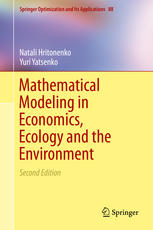

Most ebook files are in PDF format, so you can easily read them using various software such as Foxit Reader or directly on the Google Chrome browser.
Some ebook files are released by publishers in other formats such as .awz, .mobi, .epub, .fb2, etc. You may need to install specific software to read these formats on mobile/PC, such as Calibre.
Please read the tutorial at this link: https://ebookbell.com/faq
We offer FREE conversion to the popular formats you request; however, this may take some time. Therefore, right after payment, please email us, and we will try to provide the service as quickly as possible.
For some exceptional file formats or broken links (if any), please refrain from opening any disputes. Instead, email us first, and we will try to assist within a maximum of 6 hours.
EbookBell Team

4.8
24 reviewsUpdated to textbook form by popular demand, this second edition discusses diverse mathematical models used in economics, ecology, and the environmental sciences with emphasis on control and optimization. It is intended for graduate and upper-undergraduate course use, however, applied mathematicians, industry practitioners, and a vast number of interdisciplinary academics will find the presentation highly useful.
Core topics of this text are:
· Economic growth and technological development
· Population dynamics and human impact on the environment
· Resource extraction and scarcity
· Air and water contamination
· Rational management of the economy and environment
· Climate change and global dynamics
The step-by-step approach taken is problem-based and easy to follow. The authors aptly demonstrate that the same models may be used to describe different economic and environmental processes and that similar investigation techniques are applicable to analyze various models. Instructors will appreciate the substantial flexibility that this text allows while designing their own syllabus. Chapters are essentially self-contained and may be covered in full, in part, and in any order.
Appropriate one- and two-semester courses include, but are not limited to, Applied Mathematical Modeling, Mathematical Methods in Economics and Environment, Models of Biological Systems, Applied Optimization Models, and Environmental Models. Prerequisites for the courses are Calculus and, preferably, Differential Equations.